We're moving our live coveragepublished at 19:24 BST 30 September 2024
For technical reasons, we're moving our live coverage.
Israel tells the US it plans to launch a limited ground incursion into Lebanon as soon as Monday, a US official says
Hezbollah's deputy leader says it's ready for an Israeli ground offensive, as Israel continues air strikes across Lebanon
It's the first speech by a high-ranking official since Israel killed Hezbollah leader Hassan Nasrallah, Naim Qassem says the battle "may be long"
In Lebanon, officials say more than 1,000 have been killed in the past two weeks, while up to a million people may now be displaced
Edited by Emily Atkinson, with Nafiseh Kohnavard, Carine Torbey and Hugo Bachega reporting from Lebanon
For technical reasons, we're moving our live coverage.
A reporter says Netanyahu is "actually expanding the war" in both Lebanon and Yemen, despite US calls for diplomacy and a ceasefire. Miller is asked if the Israeli PM is simply ignoring the US.
Miller says he "takes issue" with the question, and says that Israel didn't attack Hezbollah or the Houthis first.
Israel, like any country in the world, has the right to defend itself, Miller says again.
But they should do it in a way that "avoids miscalculation" and doesn't needlessly increase tensions, he adds.
When asked if Israel is showing restraint in its actions, Miller avoids a direct response, insisting the US wants to see a diplomatic resolution but again says the US supports Israel's right to self defence.
Matthew Miller is now asked about the humanitarian impact if the one million people in Lebanon who have been displaced, according to Lebanese officials, were to leave the country.
"Of course we're worried about the humanitarian impact, we're worried about how that can be destabilising," he says.
Miller continues, saying the "best thing" countries can do is help find a diplomatic resolution that allows people to return to their homes.
The US State Department spokesperson says it's "early days" but the US is working with humanitarian organisations on how to best provide humanitarian aid in the region.
Miller now takes questions from the BBC's Tom Bateman who asks, given recent events - more than 1,000 people killed and more than one million displaced, according to Lebanese officials - did Israel ignore the US's calls for restraint?
Miller replies by saying that the killing of Hezbollah chief Hassan Nasrallah was "ultimately something that's good for the country" and the US certainly doesn't want to see any civilians harmed.
He repeats his earlier comments that military pressure can "enable diplomacy" but it can also lead to "unintended consequences" and "miscalculations", he says.
We're going to continue to engage with Israel to try to de-escalate tensions, he says, but adds that Israel is a sovereign country "that is going to make these decisions for itself".
The US State Department spokesperson is asked if a 21-day ceasefire is the focus of diplomatic efforts.
Matthew Miller confirms it is the focus of America's efforts, adding that it's linked to a "broader diplomatic resolution".
He's then asked if the view is that it's productive for Israel to continue its military campaign while carrying out diplomatic talks.
"We recognise that at times military pressure can enable diplomacy, it is also true that military pressure can lead to miscalculation, it can lead to unintended consequences."
"These are decisions that they have to make," he adds.
The next reporter asks about the US's long-term strategy in the region. What would happen after a diplomatic resolution to the conflict in Lebanon? Especially if there is a "power vacuum" in the country, the reporter asks.
There has been a power vacuum in Lebanon for some time, Miller says, largely because Hezbollah holds a veto over choosing a new president.
Hezbollah's influence has prevented the country moving forward in many ways, he adds, including on UN Security Council Resolution 1701, which calls for an end to hostilities between Israel and Hezbollah.
It is an "unalloyed good for the region and the world" that Hezbollah leader Hassan Nasrallah is now dead, Miller says. The US wants to see the people of Lebanon choose their own future, and not be "held hostage to a terrorist organisation".
Ultimately we want to see a "diplomatic resolution to this conflict", Miller continues, which allows citizens on both sides of the border to return to their homes.
Asked if this means the US no longer supports calls for a ceasefire, he replies that "we do, of course, continue to support a ceasefire".
He says this would mean a 21-day ceasefire - which is what a 12-bloc group of nations called for at the UN last week - where both sides "would stop attacking the other and we would reach a diplomatic solution".
He goes on to say that military pressure can "enable diplomacy" but it can also lead to "miscalculations" and "unintended consequences", adding that the US is still "in conversations with Israel about this.
Miller also says the conflict started when Hezbollah started launching cross-border attacks on Israel, a day after the 7 Oct attacks by Hamas on Israel.
When asked if the US has a "red line" or an idea of success for a ground invasion of Lebanon, Miller repeats that Israel has a right to defend itself, and he declines to discuss "private" conversations the US had about operations with the Israelis.
"Ultimately" the US wants to see a diplomatic resolution to the conflict, he says. The reporter who asked the question says this is a change in language.
A journalist asks what the understanding is of what Israel is planning to do.
Spokesperson Matthew Miller says he'll leave it to Israel to speak about its military operations, adding that "we've been engaged in conversations" with Israel about its operations.
Millers says Israel has told the US about "limited operations" near its border with Lebanon.
State Department spokesman Matthew Miller begins the briefing with his opening remarks.
He says Secretary of State Antony Blinken and other senior department officials have been monitoring and responding to "unfolding events in the Middle East" over the weekend.
Blinken spoke to his French counterpart yesterday about ongoing efforts to de-escalate tensions in the region and he'll be speaking to other counterparts today, he says.
Miller adds that the US "supports Israel's right to defend itself against terrorism" and at the same time, it ultimately wants a "diplomatic resolution" to conflict in the Middle East.
We're now hearing from US State Department spokesperson Matthew Miller. His department is responsible for America's foreign policy.
We don't know what Miller will brief about during his update, but stick with us as we bring you the latest from it.
Watch: Biden repeats call for Israel-Hezbollah ceasefire
US President Joe Biden has repeated his call for a ceasefire between Israel and Hezbollah.
It comes after a US official confirmed to the BBC's US partner CBS following reports that Israel was planning a ground incursion into Lebanon as soon as Monday.
At a Washington DC press conference, the president was asked if he was aware of, and comfortable with, Israel's plan to launch a "limited operation into Lebanon".
Biden replied: "I am more aware than you might know and I'm comfortable with them stopping."
He added: "We should have a ceasefire, now."
Yemen's Houthis say they will escalate military operations against Israel in response to its attacks on the country on Sunday.
He says Israel carried out 17 air raids on Yemeni infrastructure, killing five people and injuring a further 57.
Israel said the strikes were responding to Houthi attacks on Israel.
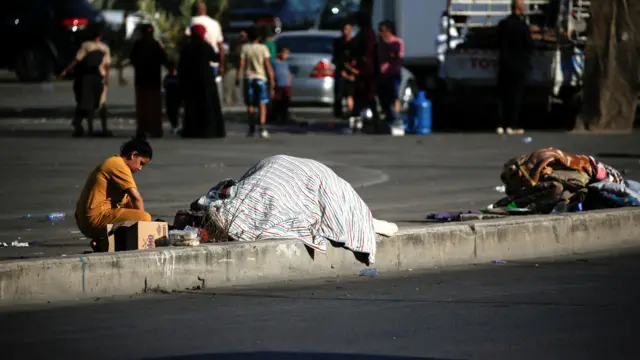 Image source, Reuters
Image source, ReutersAs we've been reporting, Israel's continuing air strikes may have already forced as many as one million people from their homes across Lebanon.
The World Health Organisation (WHO) now says the mass displacement and poor living conditions facing people in Lebanon will likely increase the risk of disease.
The WHO estimates that 118,466 people were newly displaced between 23 and 27 September.
The country's health system remains overstretched by the crisis it is facing, the agency says in a situation report.
A US official confirms Israel has notified the US it intends to launch a limited ground incursion into Lebanon, the BBC's US partner CBS is reporting.
The official says the operation could start as soon as today.
We'll bring you more on this as we have it.

Hesham Shawish
BBC Monitoring Middle East Journalist
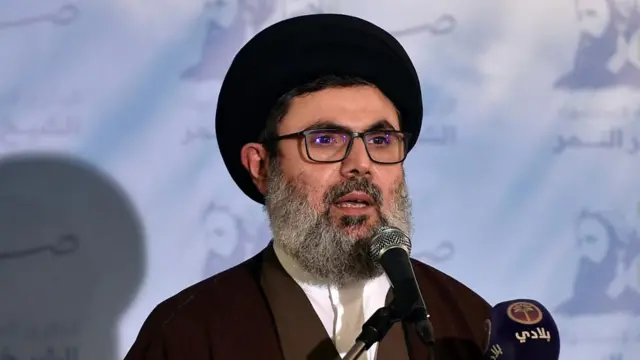 Image source, Reuters
Image source, ReutersIn the wake of Hassan Nasrallah’s death over the weekend, some Lebanese media outlets have speculated on his potential successor, with some pointing to Hashem Safieddine.
Safieddine is one of Nasrallah’s maternal cousins, described as more hard line. He is the head of Hezbollah's executive council, managing the group’s operations. His son is also the son-in-law of the late Iranian general Qassem Soleimani.
The party is keeping quiet still, given the parlous security situation. We don’t know who the successor will be or even when or where Nasrallah’s funeral will be held.
In the meantime, Hezbollah’s deputy leader Sheikh Naim Qassem has temporarily assumed leadership. In a speech aired earlier today on the group’s Al-Manar TV channel, Qassem said the group would choose asuccessor “as soon as possible”, while giving the impression that the group was in no rush.
He said that in the structure of the group were deputies and reserve alternatives in case any leader is injured or killed.
The weight of the ongoing war heavily burdens Hezbollah, and security risks faced by members of the party take priority before the designation of a successor.
Qassem has vowed to continue the group’s actions against northern Israel, though at a reduced frequency. “We will not budge an inch from our position”, Qassem told viewers.
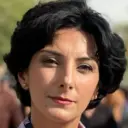 Nafiseh Kohnavard
Nafiseh Kohnavard
BBC Persian Middle East correspondent, Beirut
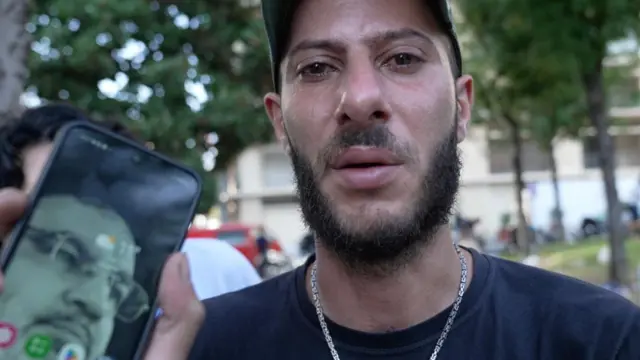
“What’s left to say. Our leader is gone. We are orphaned.”
A man interrupts one of our live broadcasts in downtown Beirut, showing a picture of the late Hezbollah leader, Hassan Nasrallah.
I asked his name. “We Shias don’t have a name anymore,” he says before leaving.
But not all Nasrallah’s supporters believe that he is dead. There are still conspiracy theories spreading here.
“No, he is alive. I am sure. It is part of the war tricks. They want to deceive the enemy,” says Jihan, a 55-year-old woman who has fled her home in southern Lebanon and now is sheltering at one of the schools in Beirut. Her neighbour Amal is also thinking the same way.
I remind them that the group’s press office has already confirmed and there was a mourning gathering over his body - but still they insist on their belief.
They think it is not possible that Israel has done this and “no big revenge” has been taken immediately by Hezbollah and its main supporter Iran.
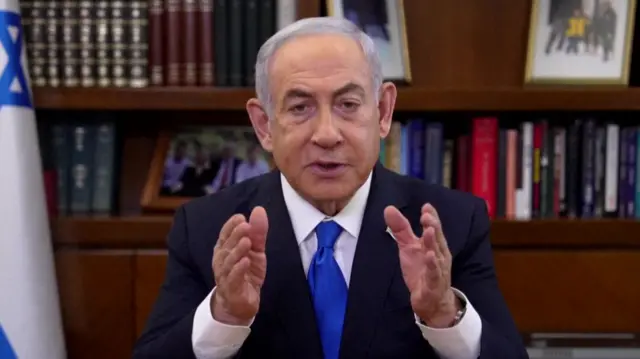 Image source, Israeli government
Image source, Israeli governmentIsraeli Prime Minister Benjamin Netanyahu has just issued a direct message to the people Iran, as his country's campaign continues against Iranian-backed groups Hamas, Hezbollah and the Houthis.
In a three-minute video posted to X, Netanyahu accuses the leaders of Iran of making speeches about defending Gaza and Lebanon but that "every day that regime plunges our region deeper into darkness and deeper into war".
"There is nowhere in the Middle East Israel cannot reach, there is nowhere we will not go to protect our people and protect our country," he says.
"With every passing moment, the regime is bringing you, the noble Persian people, closer to the abyss," he says.
Netanyahu says that when Iran is "finally free" – saying that moment will come "a lot sooner than people think" – then everything will be different and the two nations will be at peace.
"Iran will thrive as never before," he says, adding: "Don't let a small group of fanatic theocrats crush your hopes and your dreams. You deserve better."
"The people of Iran should know Israel stands with you. May we together know a future of prosperity and peace," he adds.
Callum May
Reporting from Heathrow airport
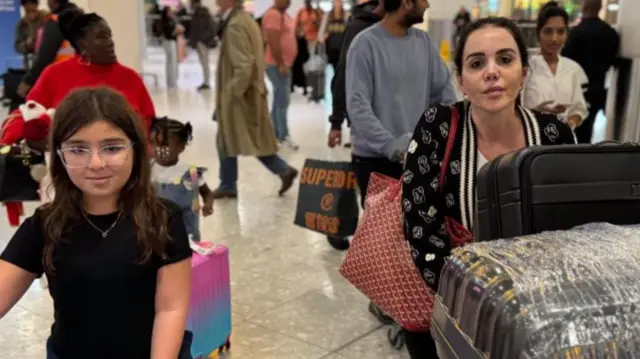 Image source, BBC/Callum May
Image source, BBC/Callum MayNatalie Kesserwani, pictured with her daughter, fears Lebanon 'turning into Gaza'
More British-Lebanese families have arrived in London – without any certainty about when they will return to Beirut.
Natalie Kesserwani, a British-Lebanese woman who lives in central Beirut, arrived on a scheduled flight at Heathrow on Monday afternoon with her mother and children.
As she pushed her large pink suitcases wrapped in cellophane through Terminal 3, she said she was likely to stay with family in the UK for the long term.
"The situation is becoming very intense. There is really no safe area in Lebanon. Any area can be targeted and hit. If it’s the cyber boom sounds, or the actual attack sounds, they’re very loud and scary."
Kesserwani said she feared Lebanon "turning into Gaza".
"The destruction is everywhere, all around the country," she says.
Like Kesserwani, Christopher Fawaz arrived on a scheduled flight from Beirut and was met by his father Abdullah at Heathrow.
He said he saw long lines of people sleeping on the street on the way to the airport in Beirut. "The airport seems in disarray," he said.
"There are people sleeping on the gate of the airport, in front of the airport. I’m not sure if it’s because they have nowhere to stay or they are just waiting for the soonest flight available to get out."
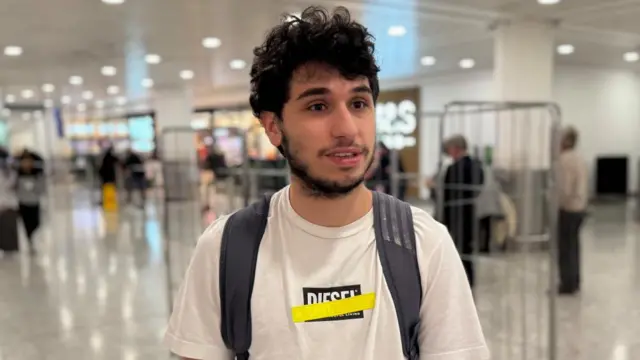 Image source, BBC/Callum May
Image source, BBC/Callum MayChristopher Farwaz says Beirut airport is in 'disarray'